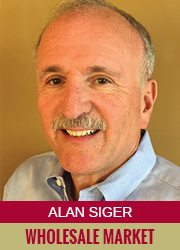While attending the New York Produce Show this past December,  I had the chance to spend time with a few dear friends in the wholesale produce business. Most of these folks have operations on a terminal market, or are major distributors in the area they service; their companies are family-owned, some with the third generation now running the show. Nearly everyone I was with was born and bred into the produce business.
I had the chance to spend time with a few dear friends in the wholesale produce business. Most of these folks have operations on a terminal market, or are major distributors in the area they service; their companies are family-owned, some with the third generation now running the show. Nearly everyone I was with was born and bred into the produce business.
While catching up, our conversation turned to how today’s wholesaler is affected by the explosion of interest in local produce. For Midwestern and Northeastern wholesalers, sales always softened somewhat as the local harvest of fresh fruits and vegetables started. For example, in Pittsburgh, one did not have to look at the calendar to know that August was upon us. Many folks had backyard gardens and shared the bounty of their efforts with friends that did not. Years ago, retail chain stores would sell some local products (particularly sweet corn and tomatoes), but stores did not make a concerted effort to push local crops.
In the past few years, as retailers capitalized on the public’s interest in locally grown product, the landscape changed dramatically. For many wholesale distributors, the seasonal downturn in sales caused a significant hit to the top line. It doesn’t matter that there is no definition of locally sourced product. One retailer may define local as grown within a certain radius of their stores, yet another may define it as grown-in-state. It also doesn’t matter that locally grown does not mean safer or more nutritious. Perception is reality, and what matters is the explosion of consumer demand for locally grown fruits and vegetables is real and is here to stay for the foreseeable future.
So how does the produce wholesaler take advantage of this trend and turn it into revenue growth? My friends lament about how unfair it is that major customers require wholesalers to obtain extensive food safety certifications, while that customer looks the other way with a small farmer, because he or she is a local grower. This changed with the November 2015 release of the final FDA Food Safety Modernization Act (FSMA) regulations that require even small growers that distribute to commercial retailers or foodservice to meet minimum requirements over the coming years.
Soon, large retailers will reject product that has not been certified to have met the required standards under the new FSMA regulations. Industry leaders, such as Wegmans, did not wait until now to act, but rather worked with the small growers in their area to help them do what it takes to establish a qualified food safety program. More than 10 years ago, Wegmans established a program to assist hundreds of local suppliers to reach at least the minimum standards of Good Agricultural Practices. Alongside Cornell University, Wegmans worked to establish an education program geared to assist small growers with the cost of audit programs to ensure a safe source of locally grown product.
Wholesalers need to quit whining about the USDA’s pushing locally grown at the expense of other sourced product; the “know your farmer, know your food” slogan may go away, but the consumer’s interest in where their food comes from will not.
This change in the regulations offers wholesalers an opportunity to become a distribution hub for small regional growers. Wholesalers need to quit whining about the USDA’s pushing locally grown at the expense of other sourced product; the “know your farmer, know your food” slogan may go away, but the consumer’s interest in where their food comes from will not.
To ensure compliance with the new regulations, smaller growers who traditionally sold product to the local chain store will soon be scrambling to be able to continue to sell to that customer. Now is the time for wholesalers to reach out to local growers with a program similar to Wegmans’ to help them comply with the new FSMA regulations.
To enable a consistent source of local product to meet your customer needs, you should consider looking into setting up an education program for regional growers. Use this program to promote your company to the rapidly expanding local grower community. Offer assistance with the compliance audits and paperwork. Offer the program for free, or at a nominal cost, if growers agree to have you market product for them.
In addition to building a base of certified regional suppliers, you’ll build your company’s reputation as being the go-to place for both growers and buyers of locally grown produce. This will increase your visibility, help you to gain new customers, and grow sales in your overall product line.
Look around, the produce marketing landscape is rapidly changing. Many of these newer local growers have never heard of a terminal market, and they are unaware of what the modern wholesaler can offer. It’s time to make local an asset to your bottomline.
Alan Siger is chairman of Siger Group LLC, offering consulting services in business strategy, logistics, and operations to the produce industry. Prior to selling Consumers Produce in 2014, Siger spent more than four decades growing Consumers into a major regional distributor. Active in issues affecting the produce industry throughout his career, Siger is a former president of the
United Fresh Produce Association.





